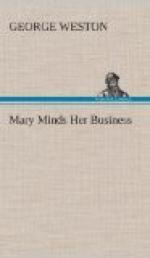“Oh, dad,” Mary had said, looking up and speaking on impulse, “did I hear you say last night that Burdon Woodward was in New York?”
“No, dear. Boston.”
“Mm,” thought Mary. “He’d say he was going to Boston for a blind.” And for many a week after that she slyly watched his fingers, to see if she could catch him red-handed so to speak, wearing one of those rings! Yet even while she glanced she had the grace to smile at her fancies.
“All the same,” she told herself, “it sounded an awful lot like him.”
The encounter which I am now going to tell you about took place one morning after Mary had been elected to the presidency of the company. She had just finished breakfast when Burdon telephoned.
“Your father had some private papers in his desk down here,” he said. “I was wondering if you’d like to come down and look them over.”
“Thank you,” she said. “I will.”
Josiah’s private room in the factory office building had been an impressive one, high-ceiled and flanked with a fire-place which was, however, never lighted. Ancestral paintings and leather chairs had added their notes of distinction. The office of any executive will generally reflect not only his own personality, but the character of the enterprise of which he stands at the head. Looking in Josiah’s room, I think you would have been impressed, either consciously or not, that Spencer & Son had dignity, wealth and a history behind it. And regarding then the dark colouring of the appointments, devoid of either beauty or warmth, and feeling yourself impressed by a certain chilliness of atmosphere, I can very well imagine you saying to yourself “Not very cheerful!”
But you wouldn’t have thought this on the morning when Mary entered it in response to Burdon’s suggestion.
A fire was glowing on the andirons. New rugs gave colour and life to the floor. The mantel had been swept clear of annual reports and technical books, and graced with a friendly clock and a still more friendly pair of vases filled with flowers. The monumental swivel chair had disappeared, and in its place was one of wicker, upholstered in cretonne. On the desk was another vase of flowers, a writing set of charming design and a triple photograph frame, containing pictures of Miss Cordelia, Miss Patty and old Josiah himself.
Mary was still marvelling when she caught sight of Burdon Woodward in the doorway.
“Who—who did this?” she asked.
He bowed low—as d’Artagnan might have bowed to the queen of France—but came up smiling.
“Your humble, obedient servant,” said he. “Can I come in?”
It had been some time since Mary had seen him so closely, and as he approached she noticed the faultlessness of his dress, the lily of the valley in his buttonhole, and that slightly ironic but smiling manner which is generally attributed to men of the world, especially to those who have travelled far on adventurous and forbidden paths. In another age he might have worn lace cuffs and a sword, and have just returned from a gambling house where he had lost or won a fortune with equal nonchalance.




